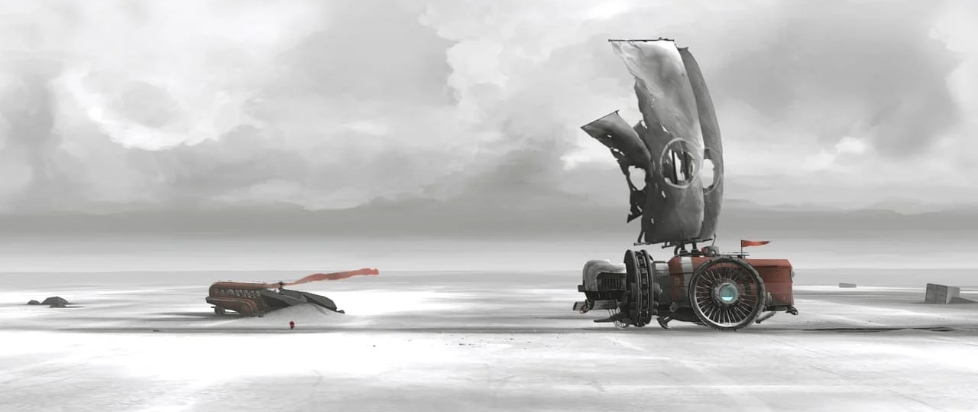
Mechanical Sympathy
 This is a reprint of the Games essay from Issue #62 of Exploits, our collaborative cultural diary in magazine form. If you like what you see, buy it now for $2, or subscribe to never miss an issue (note: Exploits is always free for subscribers of Unwinnable Monthly).
This is a reprint of the Games essay from Issue #62 of Exploits, our collaborative cultural diary in magazine form. If you like what you see, buy it now for $2, or subscribe to never miss an issue (note: Exploits is always free for subscribers of Unwinnable Monthly).
———
Despite a solid soundtrack and an intriguing setting, Far: Changing Tides somehow didn’t click for me. The core gameplay of managing a sub, less driving it and more keeping it fueled up, paired with occasional ventures outside of it to do some basic platforming, wasn’t enough to keep me hooked. Afterwards, I found out that Changing Tides was actually a sequel; a predecessor came out back in 2018 called Far: Lone Sails. I gave the older iteration a shot. A smaller, more focused game where you manage an off-road steam engine? That one worked for me. It’s not too surprising that Lone Sails originally started out as a student project, because it’s a game that’s wonderfully, almost perfectly simple. Straightforward gameplay, excellent pacing and an underrated musical score made it one of my favorite gaming experiences of 2022. Better still, it got me to understand Changing Tides better. While it isn’t as strong as the older game, once you get a better understanding of the series’ atmosphere and flow, the sequel really opens up.
The Far series has something in common with Spiritfarer, as the two franchises not only have gameplay based on managing tasks to keep giant vehicles running smoothly, but both are about forging connections. Where Spiritfarer has you bond with an expanding cast of quirky characters, Far sees you bond with a single machine that carries you throughout the entire game. The core idea of Far isn’t just to use an automotive to traverse a post-apocalyptic landscape – it’s to develop a relationship with it as you go along. You keep track of what it needs, you upgrade it in order to progress and over time you gain a sense for what it wants in specific situations. The vehicles in these games aren’t sentient, but they have distinct characters, so much so that they almost feel like they’re alive. These games are an excellent introduction to the concept of mechanical sympathy, where you learn to care for a machine to the point where you see it as more than just metal.
There’s another kind of mechanical sympathy present in these games. Far’s environmental collapse is implied to be the result of a society’s overreliance on machines dependent on fossil fuels. The games can give players an inkling as to why the people of this fictional world came to overuse machines that lead to their own downfall. A steam engine, a submarine, a massive walker; these vehicles weren’t just incredibly useful, they inspire a sense of wonder. I can’t help but find myself wanting to like them, even with the subtextual baggage. Experiencing a piece of media that has sympathy for the mechanical devil doesn’t just feel rare, but also quite relevant concerning our own complicated relationships with dirty, yet endearing, machines.




